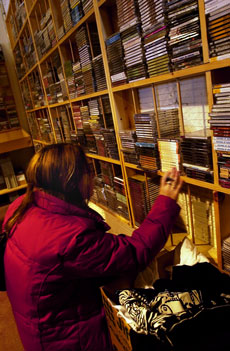Record store inconspicuous, but important

Online Poster
March 2, 2005
From the outside, Parasol, one of Champaign-Urbana’s record stores, hardly seems like a store at all. It’s located in an unassuming red brick building, tucked away on a quiet side street in Urbana. A mere sticker in the window lets passersby know what’s within.
The quiet gives way, though, as you step inside and the place opens up, revealing a world filled with all things music.
In a sense, the modest storefront suits the record shop, as Parasol, located at 303 W. Griggs St. in Urbana, has been quietly influencing the Champaign-Urbana music scene for nearly
20 years.
For one, the company has helped countless local artists get deals with major record labels, gotten them licensed overseas and even helped start their own labels and press their own records. On top of that, Parasol runs five of its own record labels.
Get The Daily Illini in your inbox!
They’ve been longtime champions of local artists and been pivotal in boosting bands such as Beauty Shop, Absinthe Blind, Like Young and Hum towards success in the intensely competitive music industry.
“We’ve been lucky – so much good music has come from this area,” said Roy Ewing, Parasol employee of six years. “We just want to promote it.”
The store specializes in independent music, but the limits to that genre are vague. Abby Folberg, sophomore in FAA, sees the “independent” label as the reason that alternate record shops need to exist.
“Indie music is just anything not in the mainstream,” Folberg said.
Many would deem the bands they sell obscure, but doing so, according to Michael Roux, promotions manager for Parasol, ignores what such places have to offer as well as the new music they may present. Parasol releases a top ten list of its highest selling albums every week in The Buzz. The list is an indication of the type of music that they sell, as well as a reliable source for artist recommendations.
While a large segment of the student population can find the music they are looking for at Parasol, Roux also noted it does not cater to everyone’s tastes.
“Our forte is records released by small labels around the country and world,” said Geoff Merritt, owner of Parasol and That’s Rentertainment video store. “So if someone is looking for the type of thing the big box stores aren’t carrying, they might want to stop by and see what we’ve got.”
One could easily draw connections between Parasol and the record store portrayed in Nick Hornby’s novel High Fidelity – a place of meticulously organized vinyl records and well-considered opinions about which bands influenced which.
“There’s a lot of parallels that most of us don’t want to admit,” Merritt said.
In fact, a fake record store was created in Chicago during the filming of the movie version of High Fidelity, and Parasol was asked to send a box of merchandise. Stickers of bands under Parasol labels can be seen in the background of the film.
The independent college record store, as a concept, has been under threat by the relative ease with which students can download music – legally or otherwise. Posted in the window of the newly out-of-business Record Service, on Green Street, is the ominous message to students that downloading illegally is stealing from the artist.
Supporting local record stores is the other, more legitimate option.
“Going into a third-party place, with people you don’t know, with music that is not yours – it’s a sense of community that can’t be achieved online,” Roux noted.
Getting a physical album, with all of the intended artwork, the liner notes and so on, is an experience fewer and fewer students are indulging in, and one can even go a step further from a CD and buy the vinyl.
The vinyl record is an important aspect of Parasol. Not only do they sell newly released albums on vinyl at relatively cheap prices, the medium has come to mean much more to them.
“It’s warmer, and I think people just like seeing the needle drop,” Roux said. “Plus it sounds more authentic.”
Roy Ewing, Parasol’s resident vinyl enthusiast, noted the difference in sound as well as the aesthetic difference.
“The whole artwork goes hand in hand with the music,” he said. “It takes time to listen to, so you have to be in the right mindset.”
Parasol now distributes music globally from their Web site, www.parasol.com, and no matter how much the industry is altered with student downloading, Parasol is sure to be a part of it.
“One way or another people are going to be listening to music,” Merritt said. “Years from now, we’ll still be involved.”






